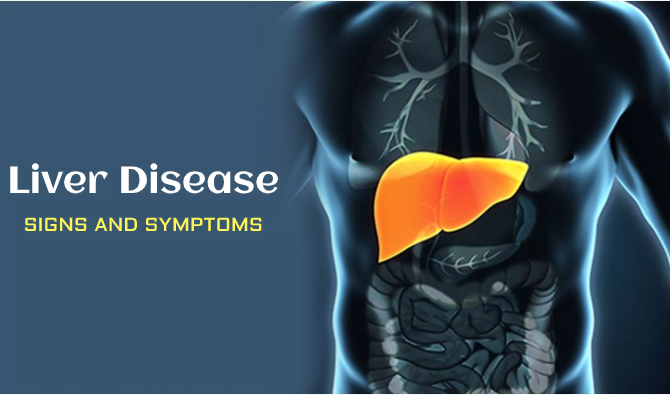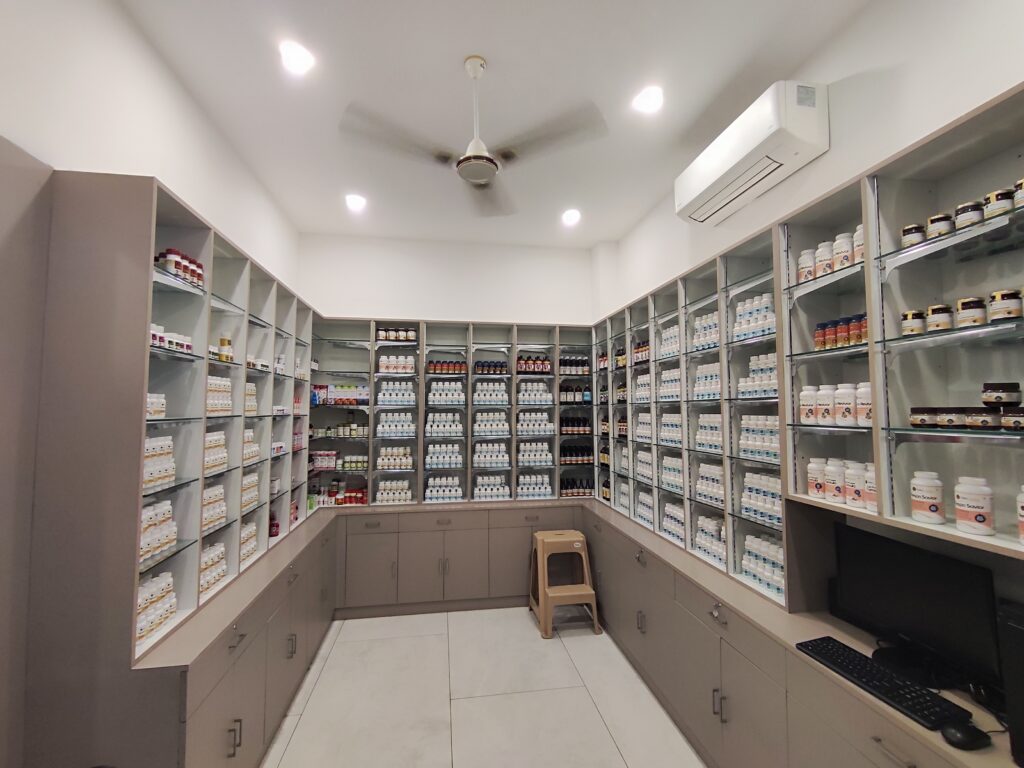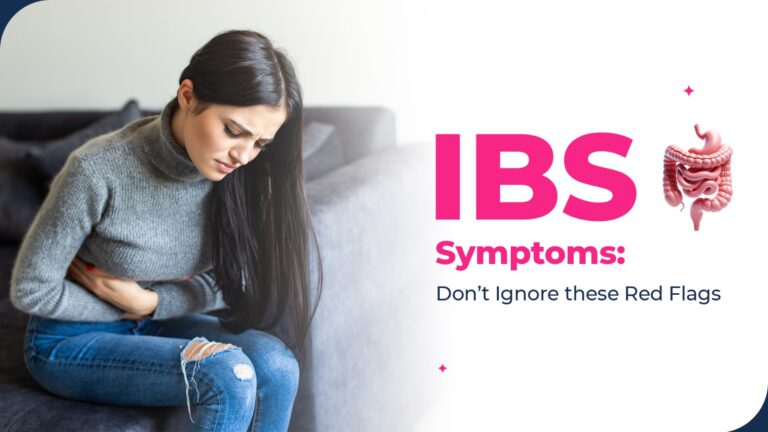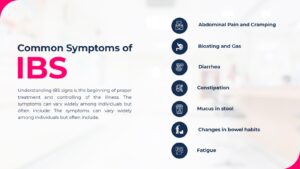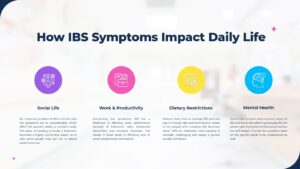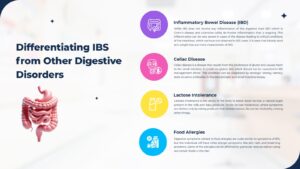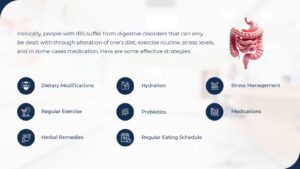Understanding IBS: Ayurvedic Overview
Irritable Bowel Syndrome (IBS) is a worldwide known gastrointestinal disease, which affects the lives of numerous people. According to Ayurveda, this condition called irritable bowel syndrome is due to the disturbance of the three regulatory principles of the body called doshas: Vata, Pitta & Kapha. Ayurveda is an extensive system of traditional medicine coming from India and its major principle is the balance of all functions and processes to be aligned with the surrounding world. The Ayurvedic perspective focuses on digestive health as being the key to good health and any disruption of the same results in a plethora of health complications.
According to Ayurveda, IBS has an origin derived from Vata dosha; it controls movement and transmission of information within the human body. When Vata is ‘out of whack’ it can affect the normal functioning of the digestive system hence leading to the presentation of the IBS symptoms. Pitta and Kapha doshas can also be a cause of the ailment since they affect the manifestations and the degree of their severity.
Common Symptoms of IBS
Understanding IBS signs is the beginning of proper treatment and controlling of the illness. The symptoms can vary widely among individuals but often include: The symptoms can vary widely among individuals but often include:
Abdominal Pain and Cramping
Most IBS patients experience this as a constant and a very bothersome symptom of the illness. This pain mostly has a cramping nature and may be eased by a bowel movement.
Bloating and Gas
It also causes problems such as passing gas and experiencing a sensation of bloating. Swelling is common where the abdomen looks distended and pain can be severe where the condition is severe.
Diarrhea
Among all the symptoms associated with ibs, changes in the regularity and nature of bowel movements are the most characteristic. Another may feel that they urgently need to defecate, which can be quite embarrassing to the individual.
Constipation
On the other hand, IBS can also bring up the condition commonly known as constipation where one experiences sporadic bowel movement or when passing stools becomes a major and difficult task. Occasionally, it is observed that some people feel either their bowels are loose or their constipation is too severe.
Mucus in stool
Another symptom associated with the presence of white mucus, was observed in 8 of the patients. This can be rather disturbing, but is quite expected in IBS.
Changes in bowel habits
Some of these changes may include; The frequency the stool is passed, the texture of the stool and the color of the stool. A feeling of not having emptied the bowels after defecation are common among the patients with IBS.
Fatigue
Another symptom that is less documented but very apparent in IBS is fatigue. This is because chronic discomfort and the interference with life’s daily processes make the individual feel drained.
The Importance of Early Detection:
Ideally, the patient should seek medical help as early as the onset of the first sign of IBS to better manage the condition and enhance his/her way of living. If these symptoms are not treated, they may culminate in severe health complications and various other related diseases. Timely identification of IBS enables the condition’s treatment to be administered beforehand, preventing its progression. In case of IBS no treatment is applied, one experiences more severe issues like deficiencies of nutrients, loss of weight and reduced quality of life. It is crucial that a client achieves an understanding of the symptoms and or the trigger factors early so as to enable the development of a healthy strategy that would manage the symptoms effectively.
How IBS Symptoms Impact Daily Life:
Thus, IBS symptoms are known to interfere considerably with the individuals’ daily functioning, both in the physical and psychological domains. Understanding that can cause serious anxiety and even lead to the formation of a depressive background that aggravates the situation is crucial for effective treatment. Here are some ways in which IBS can affect daily life: Here are some ways in which IBS can affect daily life:
Social Life
An important problem of IBS is the fact that the symptoms are so unpredictable, which affect the person’s ability to socialize easily. The panic of needing to locate a bathroom becomes a highly concerning reason as to why some people may opt not to attend social functions.
Work and Productivity
Concerning the symptoms, IBS has a likelihood of affecting work performance because of bathroom visits, abdominal discomfort, and excessive tiredness. This results in lower levels of efficiency and at worst, employment termination.
Dietary Restrictions
Patients learn how to manage IBS and one way is through diet and since food is meant to be enjoyed with company this becomes rather difficult. Obsessive meal tracking is mentally challenging and keeps a person socially withdrawn.
Mental Health
Due to the constant and recurrent nature of IBS and due to this affecting everyday life, the patient gets frustrated, embarrassed and has low self-esteem. The toll the condition takes on the psyche needs to be underscored as well.
In case of IBS no treatment is applied, one experiences more severe issues like deficiencies of nutrients, loss of weight and reduced quality of life. It is crucial to achieve an understanding of the symptoms and or the trigger factors early so as to enable the development of a healthy strategy that would manage the symptoms effectively.
Differentiating IBS from Other Digestive Disorders:
There is a need to distinguish IBS from other related conditions so as to provide correct management. While IBS shares some symptoms with conditions like inflammatory bowel disease (IBD), celiac disease, and lactose intolerance, there are key differences: While IBS shares some symptoms with conditions like inflammatory bowel disease (IBD), celiac disease, and lactose intolerance, there are key differences:
Inflammatory Bowel Disease (IBD)
While IBS does not involve any inflammation of the digestive tract IBD which is Crohn’s disease and ulcerative colitis do involve inflammation that is ongoing. This inflammation can be very severe in cases of the disease leading to critical conditions of the intestines, which we have not observed in IBS cases. It is seen that bloody stool and weight loss are more characteristic of IBD.
Celiac Disease
Celiac disease is a disease that results from the intolerance of gluten and causes harm to the small intestine. It entails no gluten diet which should not be expected in IBS management either. This condition can be diagnosed by serologic testing, namely, tests on some antibodies in the bloodstream and small intestine biopsy.
Lactose intolerance
lactose intolerance is the ability of the body to break down lactose, a natural sugar present in the milk and dairy products. Unlike lactose intolerance, where symptoms are elicited only by taking products that contain lactose, ibs can be elicited by, among other things.
Food Allergies
Digestive symptoms related to food allergies are quite similar to symptoms of IBS, but the individual will have other allergic symptoms, like skin rash, and breathing problems. Some of the allergies can be affirmed by particular tests as well as ruling out certain foods in the diet.
Ironically, people with IBS suffer from digestive disorders that can only be dealt with through alteration of one’s diet, exercise routine, stress levels, and in some cases medication. Here are some effective strategies:
Dietary Modifications:
Elimination of these foods is very vital for a person who suffers from acid reflux disease. Causes of IBS include fatty meals, coffee, tea, alcohol, and carbohydrates that are difficult to digest known as fermentable oligosaccharides, disaccharides, monosaccharides, and polyols [FODMAPs]. A diet low in FODMAP, that is fermentable sugars, is recommended for IBS and seems to benefit many patients.
Hydration
It is recommended to remain well-hydrated, particularly, if one has to endure some diarrhea in the nearest future.
Stress Management
Stress is one of the factors that causes IBS flares. Yoga, meditation, and mindfulness in particular are effective ways to decrease the stress levels and enhance the state of your digestion.
Regular Exercise
Total body exercises allow proper circulation of food in the system hence reducing cases of constipation and diarrhea. It helps to have at least 30 minutes of moderate exercise, six to seven days a week.
Probiotics
The good bacteria can promote the overall positive shift in the bacterial population of the digestive system and alleviate the signs. It is available in foods that have been produced through fermentation such as yogurt.
Medications
At times, the person may require the use of prescribed medicines to alleviate the symptoms. These are; pain relief agents which are antispasmodics, laxatives for cases of constipation, and antidiarrheal agents. It is illegal and dangerous for one to practice medicine on his or her own without a doctor’s advice.
Herbal Remedies
Apart from the caffeine found in the tea, peppermint oil, and ginger have been proven to be effective in managing IBS. Other forms of medicine in Ayurveda include Triphala and Asafoetida that are good for digestion.
Regular Eating Schedule
Taking meals at specific times is also beneficial to the body in the management of bowel habits. Do not skip your meals as it is recommended to take many small meals rather than taking three large meals in a day.
Conclusion: Taking Control of Your Gut Health
In view of the foregoing, it could be said that IBS is indeed a difficult condition to live with, but there are ways of managing it in order to avoid serious interference with one’s quality of life. The forecast is a distinctive necessity in searching for causes to prevent complications and monitor overall health from the beginning. Thus, people with IBS can lead a healthy and fulfilling life by adopting healthier eating, exercising, mitigating stress, and visiting the right specialists.
Familiarity with the perception of IBS according to Ayurveda can give a better comprehension of the disease and include extra approaches to its treating. It has been established that Ayurveda’s concepts such as “Ashta Aahar Vidhi Vishesh Ayatane” i.e., eight rules for ingestion and preparation of food. They’s eight factors should be considered before taking food for healing to suit current practices in managing IBS. In this context, one can come to understand that, synthesizing such principles, it is possible to find those strategies and approaches that would prove most effective for each person.
However, always seek medical advice from your healthcare provider to come up with a good manageable plan to suit your condition. It is important to know that when getting the right kind of help and putting into practice good strategies, one can and will have a full fulfilling life alongside the IBS symptoms reducing its effect on one’s day to day activities.


